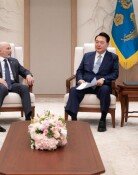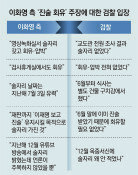Ruling and opposition should work together for constitutional revision
Ruling and opposition should work together for constitutional revision
Posted March. 26, 2018 07:53,
Updated March. 26, 2018 07:53
President Moon Jae-in will submit a constitutional amendment bill that would give presidents up to two consecutive four-year terms on Monday, following the deliberation of Cabinet members. Some criticize that constitutional revision led by a president used to take place only under a dictatorship in the past, but it does not make sense to simply compare the current state against those days because today's president does not have an authority to control the National Assembly. Moreover, the National Assembly itself is not free from blame. Ahead of the presidential election last year, presidential candidates including then-candidate Moon put forward a campaign pledge to hold a national referendum on constitutional revision in tandem with the local elections on June 13. Thus, Monday is the deadline for the government to table the bill amid uncertainty about the bill’s future.
It is true that the proposal falls short of effectively curtailing the imperialistic powers of a president. The main opposition Liberty Korea Party has apparently called for giving the National Assembly the power to name prime minister. The Bareun Future Party has discussed a system where a prime minister is picked by either the National Assembly or a president with a vote of three-fifths of lawmakers. The Party for Democracy and the Peace and Justice Party have said that the parliament should at least have the right to recommend the nominees for the office of the prime minister. Though at varied levels, all opposition parties have demanded more separation of powers, which should not be silenced obstinately by the presidential office.
No issue requires greater consensus among ruling and opposition parties at the National Assembly than the amendment of the constitution. The constitution cannot be revised without a complete consensus. In this sense, the ruling Democratic Party of Korea has a primary responsibility to lead the negotiation towards an agreement. It should not be blindly repeating after Cheong Wa Dae says that the opposition’s call for more rights to the prime minister will not work in a presidential system. If the ruling party finds it difficult to make a concession on this issue, then it should show some sincerity in negotiation by at least presenting an alternative to disperse powers. Also, if deemed necessary, the president’s speech at the National Assembly or the meeting between the ruling and opposition leaders at Cheong Wa Dae should be proposed.
Hardly anyone believes that the amendment bill will pass through the National Assembly, and it seems that the presidential office is also expecting rejection. Some even cast doubt on whether the bill was drafted to be voted down from the beginning. Once a bill is submitted, the parliament is required to vote on it within 60 days. If the bill fails to be passed, it would be the opposition parties that will be held responsible. It means that the opposition parties should not aimlessly oppose the proposal if they want to avoid a possible strong headwind.
The main opposition party, which currently has parliamentary seats enough to block the passage of the bill, has strongly condemned the president’s proposal but has yet put forward its own bill. Backing out of a pledge made during last year’s presidential election, it has also opposed the government’s plan to hold a national referendum in June, calling for the referendum to be held in October. The timing may be postponed, but the parliament should be able to at least produce a revision bill agreed upon by all parties before the local elections to save their face. If the government’s proposal is voted down, it becomes unclear whether the constitution can be amended at all by the end of the year, not to mention October. If they end up losing the current momentum, the ruling and opposition parties alike will have to shoulder the responsibility for ruining a long-awaited opportunity for constitutional revision.







